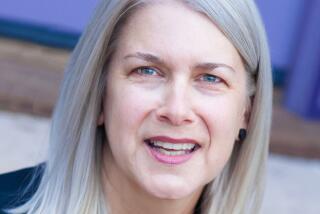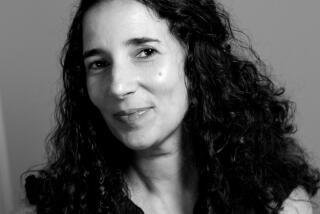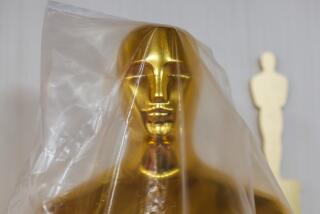French actress Mélanie Laurent steps behind the camera for ‘Tomorrow,’ an environmental doc that offers solutions
While shooting the 12-country-spanning environmental documentary “Tomorrow,” French actress-director Mélanie Laurent (“Inglorious Basterds,” “Now You See Me”) was wandering around a village in India when a local woman beckoned her over.
“There was a family of women and children inside this small house and they were like, ‘Come, come!’ ” said Laurent, who’d recently given birth to her first child at the time of filming. “I came inside and I told them about how much I missed my baby.
“This woman handed over her baby just so I could hold one in my arms,” she recalled with a laugh. “It was maybe the most powerful moment of shooting for me.”
It’s human experiences like these — babies included — that Laurent credits as the inspiration for the documentary. “I think we just wanted to make a movie for our kids,” she said. “I wanted so much to do something to prove to my son that maybe it’s going to be OK.”
Written and co-directed by activist Cyril Dion, “Tomorrow” highlights sustainable development across the globe and is the rare environmental doc to offer simple, concrete solutions to environmental and social challenges. The film, distributed by Under the Milky Way, opens Friday in Los Angeles, New York City and other major cities, with a national release to follow. It has already opened in France, where it has taken in more than $10 million at the box office.
Dion and Laurent visited permaculture farms, urban agriculture projects and community-owned renewable initiatives from the U.S. to the U.K. and from India to Finland to seek out sustainable innovations in the fields of food, energy, finance, government and education.
Shortly before the U.S. release (and worldwide Earth Day), Laurent spoke about the film, climate change and eco-consciousness.
What was the process like shooting and traveling for the documentary?
It was fun. We traveled to 12 different countries and shot during seven months. So we were traveling for a few days [at a time] and then coming back to France. We were editing the movie kind of at the same time, so there was a lot of improvisation, because sometimes we’d arrive somewhere and the people we were supposed to meet with were not there [Laughs]. And sometimes they’d have just 10 minutes for us. So we improvised a lot of things and learned so much.
Have you always been eco-minded?
My parents were always discussing politics and going to protests, so I grew up in a family where we talked about politics, we talked about the world, we were aware about what was going on. But I was not really a [political activist] until I met some people from Greenpeace who took me to Indonesia to see the deforestation. I spent five days with them and I started to get angry.
I spent two years being super angry and super disappointed and then I met Cyril, and by then, I think I was ready to find solutions. Humans have committed the worst of [climate change] in like 60 years, starting with the Industrial Revolution, when we started to destroy the world super quickly. Now we have an obligation to reverse what we did. I think we have everything we need to make things better and to make things work.
How did you like being behind the camera as opposed to acting? Do you prefer one over the other?
It’s a different pleasure. I think making a documentary, especially one about this subject, is really special. Making this documentary was kind of like my minimum contribution to the world. And we were so happy and moved by the success in France, because we absolutely didn’t expect it at all. We’d thought, “Well, it’s an ecological documentary. It’s never going to work. People don’t really care about that.” But they cared and they organized and it’s absolutely amazing. Walking in the streets of Paris, people will stop me and say, “It changed my life. I just quit my job. I’m doing this and this,” and it’s just like, wow. It’s great. So I love being an actress, but I think it’s probably more [meaningful] to make a documentary, and I just feel so lucky to have had that experience.
What do you think it would take to mobilize people to be more conscious?
It’s not a very positive thing to say, but I think the only way to have a big movement with a lot of human beings is just a catastrophe. I think human beings — and it’s so sad to say this — but human beings need to be in a very, very difficult situation before we find solutions. Otherwise, we just enjoy living in our comforts. It’s so hard for us to change. But I also feel like there are a lot of movements going on and there is a lot of hope and there are a lot of human beings who are starting to change the world.
How does this documentary compare to other environmental documentaries like Al Gore’s “An Inconvenient Truth”?
It’s kind of the logical movie to see after the Al Gore movie. Al Gore was there to make us aware of the errors we make, and his film is just like, “It’s time to wake up.” And then I think “Tomorrow” is a movie about solutions. Like how precisely we can do better. Now that people know about the awful things we’ve done to the planet, they need to know how we can repair it. This film shows people how we can fix things.
How could these measures be implemented in a country like America?
Well, we shot in San Francisco, we shot in Detroit. We shot different places around the U.S. to prove that people are changing already. The big problem now is your president [laughs]. So every step of progress we’ve made is just going to go backwards. The world now is very depressed, especially about the fact that Trump doesn’t believe in climate change, which is a really, really big problem. But I’m also worried about the politicians in France, not just America. I’m just afraid that all of these politicians will still think, “We need to make money and we need to be afraid of strangers and we need to only protect ourselves,” when it should be exactly the opposite.
Most of the solutions we showed in the movie are geared toward citizens rather than politicians. For years, people have been saying, “It’s not going to change anything,” as an excuse for not doing more. By not giving your money to all those big industries and big global organizations, you can do your job as a citizen. So it’s really important to be super aware of your power as a citizen. I think the last message of the documentary is “Yes, we can change the world. But we have to do it now, because tomorrow is already too late.”
follow me on twitter @sonaiyak
More to Read
Only good movies
Get the Indie Focus newsletter, Mark Olsen's weekly guide to the world of cinema.
You may occasionally receive promotional content from the Los Angeles Times.







